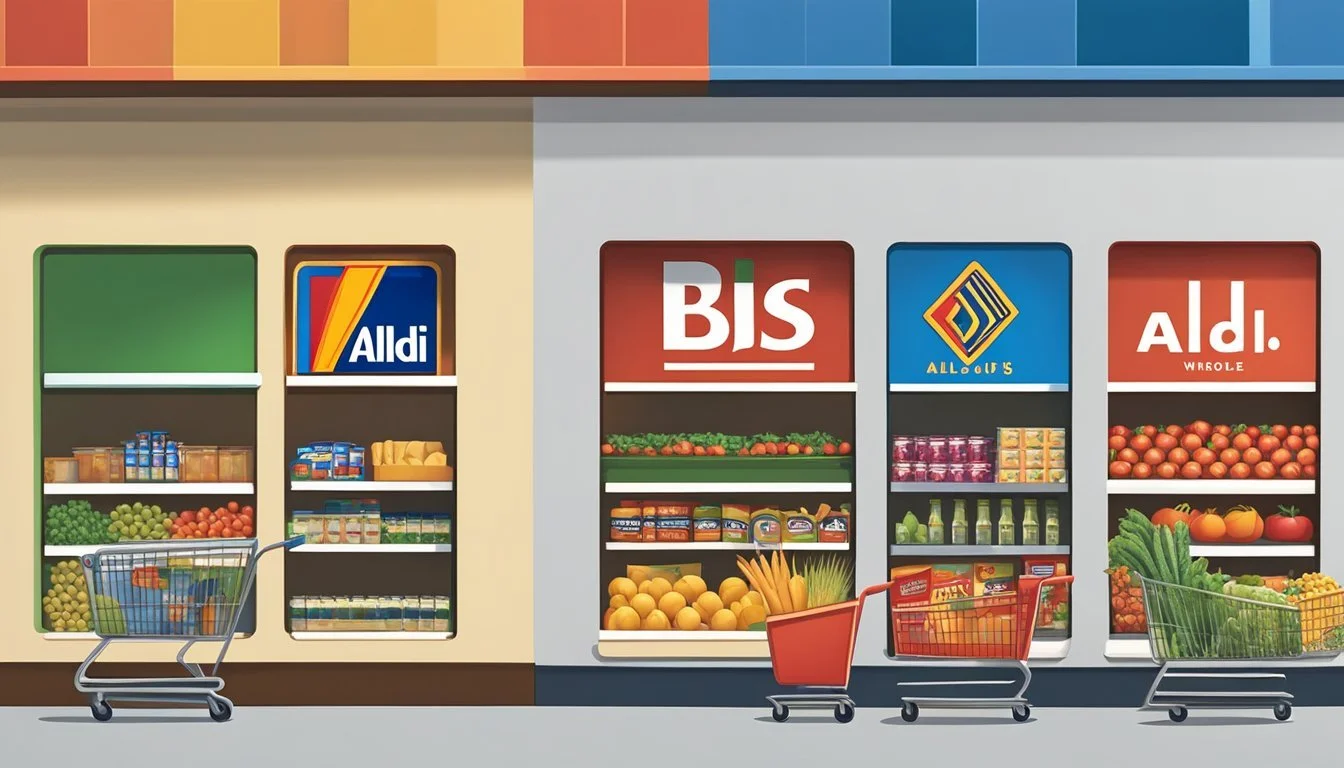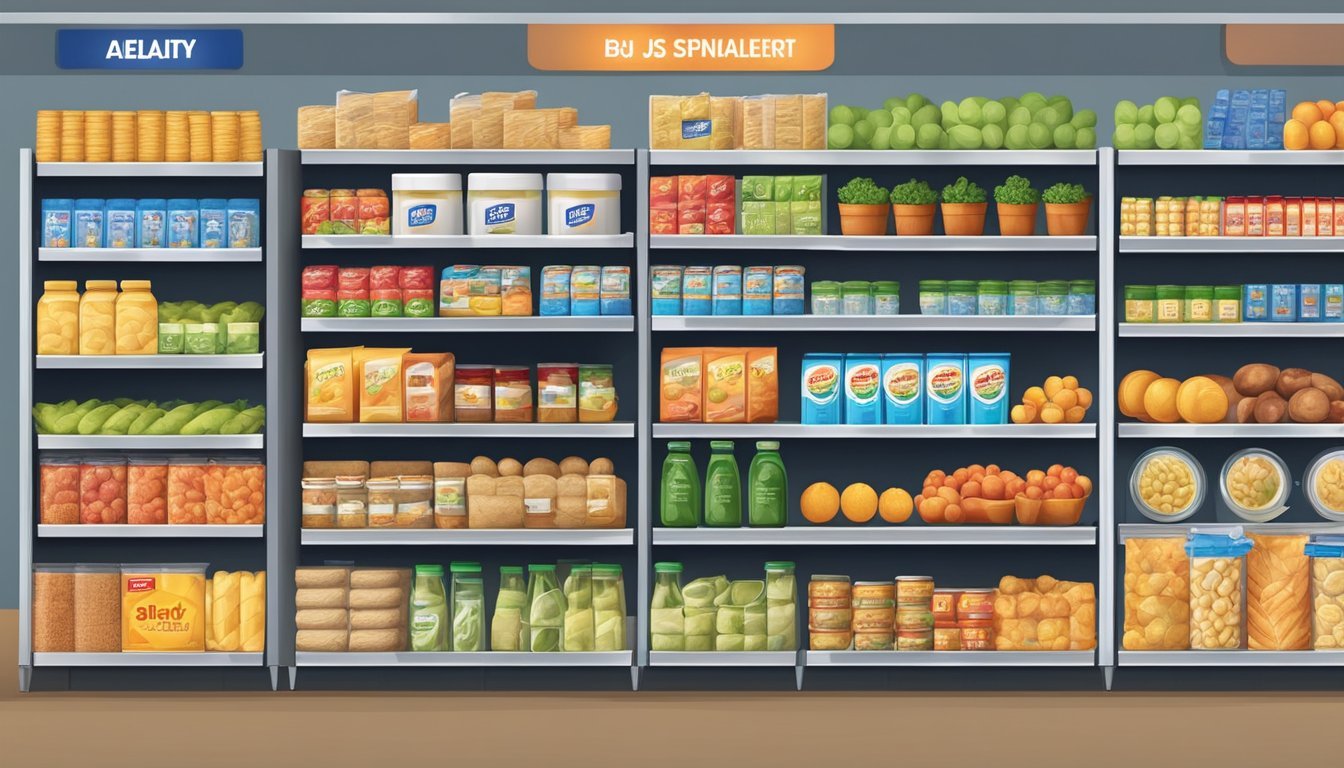Aldi vs BJ's Wholesale Club
Comparing Shopping Experience, Prices, and Selection
Part of Our Grocery Store Guide with Details on Aldi and BJ's Wholesale Club
When it comes to grocery shopping, consumers have a plethora of choices, but few debates are as common as deciding between Aldi and BJ's Wholesale Club. Aldi, a global discount supermarket chain, is renowned for its low prices and efficient shopping experience. It operates a no-frills model, offering a wide range of private-label items that help keep costs down for budget-conscious shoppers. In contrast, BJ's Wholesale Club is a membership-based warehouse club known for its bulk products and competitive pricing, predominantly located along the East Coast of the United States.
The choice between these two can hinge on numerous factors: shopping preferences, family size, and the need for diverse product offerings versus a simplified selection. Aldi is especially popular for its discounted items and regular special buys, while BJ's leverages its wholesale model to provide substantial savings for larger households looking to stock up on groceries. Each store has carved out its niche in the market by catering to specific customer needs, and understanding the nuances of their offerings can guide consumers to the store that best aligns with their shopping habits and budgetary constraints.
Evaluating Aldi and BJ's Wholesale Club isn't just about comparing prices; it's also about considering the shopping experience, product quality, and convenience. Aldi's model minimizes overhead with smaller stores and fewer employees, passing savings on to the customers. Meanwhile, BJ's offers its members the advantage of purchasing in bulk, potentially reducing the frequency of shopping trips. Both stores have unique advantages and potential downsides, making the choice between them dependent on individual consumer preferences and shopping patterns.
Company Profiles
When comparing Aldi and BJ's Wholesale Club, one delineates two distinct models of grocery retail. Aldi's lean, efficient approach contrasts with BJ's membership-based, bulk-purchase format catering to different shopping preferences and needs.
Aldi Overview
Aldi, characterized by its cost-effective operation, maintains a strong presence in the grocery industry with a focus on affordability and simplicity. Stores are typically smaller in size but well-organized, offering a curated selection of private label brands. Aldi emphasizes efficiency — from cart rental systems to minimalistic store designs — which allows the company to keep prices low for consumers.
Markets: Global, with a strong footprint in the United States and Europe.
Store Count: Thousands worldwide, with an expanding presence in the U.S.
BJ's Wholesale Club Overview
BJ's Wholesale Club operates on a members-only model, providing consumers with bulk products ranging from groceries to electronics. This East Coast-centric chain offers two membership tiers and boasts a product portfolio that includes private label options and national brands.
Markets: Primarily located along the East Coast of the United States.
Store Count: Over 220 locations offering a wide range of merchandise.
Membership Tiers: Offers two levels, Club and Plus.
Membership and Fees
When comparing Aldi and BJ’s Wholesale Club, a significant distinction lies in the membership requirements and the associated fees charged to shoppers.
Aldi's Business Model
Aldi operates on a no-frills business model. There are no membership fees to shop at Aldi, which means that anyone can access their stores without an upfront cost. The focus of this grocery store chain is to provide low prices on a curated selection of products, predominantly under its own private labels, to all of its customers without the need for a paid membership.
BJ's Membership Fee Structure
On the other hand, BJ's Wholesale Club requires customers to pay an annual membership fee. The standard membership cost is $55 per year, with a higher tier option available at $110 annually. This fee grants members access to a wide array of products at BJ’s, often in bulk quantities and at discounted prices that aim to offset the initial cost of the membership.
Price Comparison
When comparing the pricing at ALDI and BJ's Wholesale Club, customers will find distinct advantages to both stores. Each retailer offers competitive everyday prices and a range of deals and discounts that cater to budget-conscious shoppers.
Everyday Prices
ALDI is known for its cost-effective pricing structure. It regularly provides lower prices on numerous basic and essential items, particularly under their own brand names. For instance, ALDI's brand Stonemill Spices are priced at $1.19 for 6 oz. In contrast, BJ's Wholesale Club offers the larger-sized McCormick Italian Seasoning at $4.99 for 6.25 oz. This suggests that for shoppers primarily interested in smaller quantities, ALDI may offer the best price.
On the other hand, BJ's Wholesale Club often presents a better value on bulk items. For example, BJ's brand Wellsley Farms Organic Cane Sugar is sold at $8.99 for 10 lbs, which breaks down to a cost-effective option when considering price per pound. After applying a BJ's coupon, the price reduces further to $7.49. Thus, for consumers buying in larger quantities, BJ's becomes the more economical choice.
Deals and Discounts
BJ's Wholesale Club stands out for its strategic application of deals and discounts. They frequently offer coupons and promotional discounts that further reduce the prices on items that are already priced competitively. These discounts can be significant and make a substantial difference when bulk buying.
ALDI, while not offering as many traditional discount codes, excels in providing low-cost options consistently across most product categories. Shoppers do not often find coupons or the same type of promotional discounts but enjoy everyday low prices without the need for additional deals.
When comparing to other competitors such as Costco, Sam's Club, and Walmart, both ALDI and BJ's Wholesale Club offer distinct pricing advantages that depend on the shopping preferences and needs of the customer. Each store has a different pricing strategy, with ALDI generally offering the best prices for small to standard-sized quantities, and BJ's Wholesale Club offering compelling deals, especially when bulk purchasing.
Product Selection and Quality
When evaluating Aldi and BJ's Wholesale Club, shoppers will find distinct differences in product selection and quality, especially within the categories of produce, meat and dairy, and bakery items. Each store has a carefully curated inventory that caters to its business model and customer preferences.
Produce and Perishables
Aldi offers a compact selection of fruits and vegetables aimed at the budget-conscious shopper, emphasizing seasonal items to ensure freshness and cost efficiency. BJ's Wholesale Club, by contrast, presents customers with a broader variety, including both conventional and organic produce, which caters to larger families or businesses in need of bulk purchases. Quality at both retailers is generally high, with Aldi's smaller footprint ensuring rapid turnover of fresh goods.
Aldi: Limited but seasonal selection; high turnover.
BJ's: Wide variety with bulk options; offers organic options.
Meat and Dairy
Shoppers seeking a range of meat options, including chicken, beef, and pork chops, will find BJ's Wholesale Club offers a larger selection due to its bulk-selling model. Quality is prioritized, with many options available for different cuts and types of meats. Aldi, on the other hand, provides a more select range with an emphasis on affordability and popular cuts, which may suffice for everyday consumer needs.
In the dairy section, Aldi stocks a straightforward assortment of milk, cheeses, and yogurts, usually under its own private labels, resulting in lower prices. BJ's, with a wider selection, carries numerous dairy brands, including larger sizes and specialty items.
Aldi: Select and affordable meat and dairy; catered to small households.
BJ's: Extensive meat variety; broad dairy range including bulk sizes.
Bakery and Dry Goods
Both Aldi and BJ's offer a selection of baked goods such as bread, muffins, cakes, and pies. Aldi's bakery items focus on staple products at competitive prices, which often include both private-label and local bakery offerings. BJ's Wholesale Club, with its larger space, dedicates more area to a variety of bakery and dry good items, including large-size snacks which are ideal for gatherings or extended shelf life.
Aldi: Value-focused bakery selection with staples predominating.
BJ's: Extensive selection of bakery and dry goods suitable for larger needs and occasions.
Shopping Experience
When comparing Aldi and BJ's Wholesale Club, customers will notice differences in store layout and navigation, checkout and payment options, and customer service, all of which contribute to the overall shopping experience.
Store Layout and Navigation
Aldi stores are designed with simplicity in mind, maintaining a smaller footprint which often results in easier navigation. The aisles at Aldi are known for being straightforward, without any extravagant displays, helping customers to find products quickly. BJ's, on the other hand, has a more traditional warehouse layout; it's larger in size and offers a vast variety of products that can be a bit overwhelming but offers a broad selection for shoppers. BJ's tends to have clearly marked sections and aisles, but due to its larger scale, might require more time for customers to locate specific items.
Checkout and Payment Options
Aldi has streamlined its checkout process with efficiency, often having longer queues but faster service due to quicker barcode scanning. Payment options at Aldi are fairly standard for a grocery store, with most locations now accepting credit cards, contactless payments, and cash. BJ's has implemented a variety of checkout options including self-checkout, ExpressPay through its mobile app, and traditional staffed checkout lines. This variety can reduce wait times and improve convenience, especially when the store experiences high traffic which can be less at BJ's compared to warehouses like Costco.
Customer Service
Customer service at Aldi is generally efficient with a focus on speed to keep the checkout lines moving. However, because of their lower staff numbers to maintain cost savings, getting assistance in the aisles may take more time. BJ's employs a larger staff, which can aid in quicker in-person assistance within the store. Both stores offer services such as curbside pickup, but the availability and efficiency of these services can vary depending on the location and time of day.
Additional Services
When exploring the additional services offered by Aldi and BJ's Wholesale Club, customers will find a range of specialty departments, unique in-store features, and options for online shopping and delivery. Each store tailors its services to suit its business model, with BJ's offering a broader variety due to its warehouse club status.
Specialty Departments
BJ's wholesale emphasizes diverse specialty departments such as:
Appliances: They offer a selection of common household appliances.
Clothes: A variety of clothing options for adults and children are available.
Books and Electronics: Customers can find an assortment of books and electronic goods.
Furniture: They also carry a range of furniture items for different rooms.
On the other hand, Aldi focuses on groceries and does not usually feature these specialized departments.
In-Store Features
BJ's is known for its extensive in-store features, which include:
Pharmacy: There's a pharmacy for prescription medications and health consultations.
Alcohol and Wine: A sizable section is dedicated to a variety of alcohol and wines.
Rotisserie Chickens and Soda: Ready-to-eat rotisserie chickens and a vast selection of sodas are part of their offering.
Aldi, with its more streamlined approach, might not offer some of these features or engages in them at a smaller scale.
Online Shopping and Delivery
Both stores have adapted to the digital age:
Aldi: They have partnered with third-party services to offer online shopping and home delivery of their products.
BJ's Wholesale Club: They offer a direct online shopping experience with the option of home delivery as well, aiming to blend in-store and online shopping seamlessly.
In regions where BJ's has gas stations, members can benefit from discounted fuel prices, a service not provided by Aldi. The electronics section at BJ's can also be a major draw for tech enthusiasts, whereas Aldi's electronics offerings are more limited and often focused around special buys and deals.
Rewards and Savings Programs
Comparing Aldi and BJ's Wholesale Club reveals distinct approaches in their rewards and savings programs. Each store offers unique benefits that cater to their customers' preferences, from straightforward savings on purchases to more nuanced rewards for members.
Rewards Programs
Aldi does not currently operate a traditional rewards program. Instead, it focuses on offering low prices on their products without the need for membership benefits.
BJ's Wholesale Club, on the other hand, offers a couple of membership levels, each with varying rewards. The BJ's Club+ Membership grants shoppers an additional 2% in rewards on most purchases, which can accumulate over time for future discounts. It is beneficial for customers who spend over $2,750 annually, as the extra rewards will offset the higher membership cost.
Coupons and Promotional Offers
Aldi has historically not accepted traditional manufacturer coupons. They pride themselves on their Aldi-exclusive brands and low pricing model, which they claim eliminates the need for coupons.
BJ's Wholesale Club accepts a wide range of coupons, including their own BJ's coupons and manufacturer coupons. This allows shoppers to save in multiple ways:
Manufacturer Coupons: Can be used on national brand products.
BJ's Coupons: Often found in BJ's own publications or within the store app, these can be applied directly to BJ's products.
Shoppers at BJ's can also apply multiple coupons to a single item, if the store's policy allows, which can lead to significant savings. This practice is quite unique in the warehouse club space.
Comparative Analysis: Pros and Cons
In choosing between Aldi and BJ's Wholesale Club, consumers weigh factors such as savings, prices, membership fees, location, and rewards programs. Each store has a distinct set of advantages and disadvantages that cater to different shopping preferences and needs.
Aldi's Strengths and Weaknesses
Strengths:
Savings & Prices: Aldi is recognized for its low-price model, which often undercuts competitors without requiring a membership fee.
Store Brand Quality: Aldi's store brands are praised for their quality and value, offering good savings on a wide range of products.
Weaknesses:
Product Selection: Aldi offers a more limited selection compared to BJ's, which may lead to the need for multiple shopping trips.
No Bulk Options: Aldi doesn't sell items in bulk, which can limit the savings for customers who prefer to buy in larger quantities.
BJ's Advantages and Disadvantages
Advantages:
Bulk Savings: BJ's Wholesale Club allows customers to purchase in bulk, which can lead to significant savings for larger households.
Rewards Program: The BJ's rewards program offers additional savings and perks for a yearly membership fee.
Disadvantages:
Membership Fee: A membership fee is required to shop at BJ's, which can be a deterrent for those who shop infrequently or are sensitive to initial costs.
Location: BJ's has fewer store locations than Aldi, which might limit accessibility for some shoppers.
Final Verdict: Declaring the Winner
When considering Aldi and BJ's Wholesale Club as grocery options, both stores present compelling benefits. Aldi is renowned for its cost-effective pricing and efficiency in offering quality grocery items. It operates on a low-cost business model, focusing on store-brand products, which translates into savings for customers. Meanwhile, BJ's is a membership-based warehouse offering a wide range of products in bulk, which can lead to significant savings over time, especially for large households.
In terms of savings and pricing on individual items, Aldi often has the edge, with lower prices on many everyday essentials. For instance, analyses of specific products such as spices and sugars indicate that Aldi's prices can be more budget-friendly.
BJ's, conversely, may offer better value on bulk purchases and has a diverse inventory that includes electronics, clothing, and more, alongside grocery items. It also provides additional membership perks, such as coupons and cashback options.
The Winner: It is challenging to declare an outright winner as it depends on shoppers' needs.
For those seeking everyday low prices on groceries without the need for buying in large quantities, Aldi could be considered the winner.
Alternatively, for consumers who benefit from bulk purchases and a wider variety of goods, BJ's may be the preferable option.
Ultimately, the decision lies in how each store aligns with individual shopping habits and household requirements.
Personal Finance Tips
When shopping at grocery and wholesale clubs like Aldi and BJ's, consumers have substantial opportunities to maximize their financial savings. Employing strategic approaches can lead to meaningful benefits in one's personal finance, especially when dealing with grocery items.
Maximizing Savings at Grocery and Wholesale Clubs
To achieve the best savings at grocery and wholesale stores, consumers should be aware of various approaches:
Membership Benefits: Wholesale clubs like BJ's may require a membership fee, but in return offer exclusive deals and discounts. One should assess whether the fee is offset by the savings on bulk purchases.
Coupons and Deals: Shoppers should stay updated on the stores' coupon policies. While Aldi does not offer traditional coupons, they provide low prices on many items. BJ's accepts manufacturer coupons, which can be stacked with in-store deals for greater savings.
Smart Shopping Strategies
Developing and following a few shopping strategies can ensure cost-effectiveness and value for money:
Weekly Ads and Specials: Review the current week’s ads for both Aldi and BJ's. Highlighted discounts can guide one’s shopping list to the most economical options.
Bulk Buying Wisely: Purchase items in bulk from clubs like BJ's when the unit price is lower. However, it’s crucial to buy in a quantity one can realistically consume to avoid waste.
Shopping List Discipline: Before heading out, create a shopping list and stick to it. Impulse buys can quickly inflate the grocery bill, undermining savings efforts.
Disclosure and Legality
In evaluating Aldi vs BJ's Wholesale Club, one needs to understand how disclosure and legality affect their shopping experience, especially when considering any rewards or commissions that might be involved.
Affiliate Links and Commissions
When discussing BJ's Wholesale Club and Aldi, it is important to note that some online content may include affiliate links. If a shopper uses these links to make a purchase, the content creator might earn a commission at no additional cost to the shopper. Entities like BJ's may have partnership programs that offer rewards or commissions for sales referred through these links.
Affiliate Links:
Presence on a website could influence product recommendations.
Clicking leads to earning commission for website owner.
Commissions:
Paid by retailer, like BJ's Wholesale Club.
Does not affect the price paid by the customer.
Transparency and Consumer Trust
The disclosure of affiliate links and any potential commissions is crucial for transparency and building consumer trust. Both Aldi and BJ’s Wholesale Club must adhere to legal requirements to disclose these relationships. Such disclosures are typically found in the footer of a website or at the beginning/end of an article that contains affiliate links.
Legality of Disclosures:
Legally required to inform consumers of potential commission earnings.
Should be clear and conspicuous to readers.
Building Consumer Trust:
Transparency helps establish credibility with customers.
Consumers should be aware of any monetary relationships influencing content.











